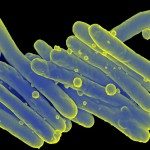Lien vers Pubmed [PMID] – 11045919
Int. J. Med. Microbiol. 2000 May;290(2):143-52
The genus mycobacteria includes two important human pathogens Mycobacterium tuberculosis and Mycobacterium lepra. The former is reputed to have the highest annual global mortality of all pathogens. Their slow growth, virulence for humans and particular physiology makes these organisms extremely difficult to work with. However the rapid development of mycobacterial genomics following the completion of the Mycobacterium tuberculosis genome sequence provides the basis for a powerful new approach for the understanding of these organisms. Five further genome sequencing projects of closely related mycobacterial species with differing host range, virulence for humans and physiology are underway. A comparative genomic analysis of these species has the potential to define the genetic basis of these phenotypes which will be invaluable for the development of urgently needed new vaccines and drugs. This minireview summarises the different techniques that have been employed to compare these genomes and gives an overview of the wealth of data that has already been generated by mycobacterial comparative genomics.

